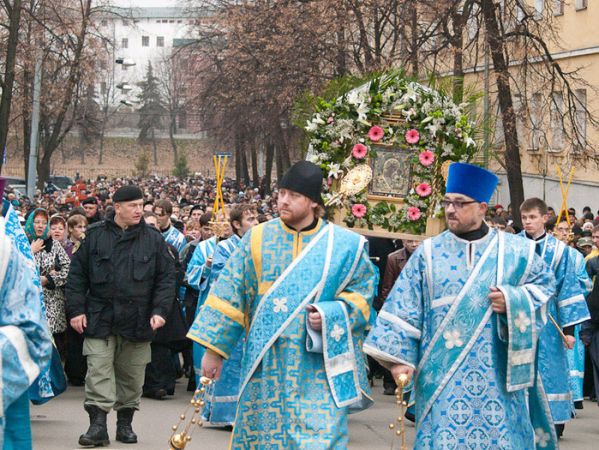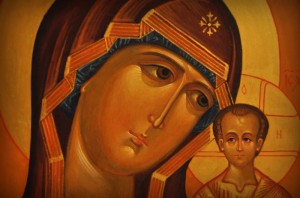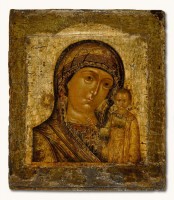November 4 is the feast day of the Kazan Icon of the Mother of God, in commemoration of the deliverance of Moscow from the Poles in 1612. Since 2005, it has likewise been celebrated in Russia as National Unity Day, replacing the Soviet-era “Day of the Great October Socialist Revolution” and the post-Soviet “Day of Reconciliation and Agreement,” both of which were held on November 7.
November 4 is a festive day in Russia. This feast day is both new and old. For the churchly part of our society, it is the commemoration of the Kazan Icon of the Most Holy Theotokos, a tradition that goes back nearly four centuries. For those who honor the country’s history, it will not come as news that as far back as 1649 the feast day of the Kazan Icon of the Mother of God (October 22 on the Old Calendar, or November 4 on the New) was declared a public holiday by Tsar Alexei Mikhailovich.
This tradition was interrupted during the long years of aggressive state atheism, being revived only in 2005 [as National Unity Day]. Time does not stand still, and new emphases and meanings have been added to this feast day. But its essential meaning has remained the same: this is a day of national unity in opposition to all that destroys and plunders our land, undermining the peaceful and constructive life of the people.
Consequently, this is a feast day of unity for all those who see themselves as people of our Russian Fatherland, who serve Russia, who construct their soul and world around it, and who remember the Motherland – wherever they may happen to be. This is a feast day for those who seek to protect age-old values and absolute moral standards, for those who will not allow the degradation of the nation as a result of liberal and tolerant lies.
This is not a day of mechanical unity for everyone who happens to live here. The roots of this feast day lie in spiritual and moral choices. The Russian people’s repentance and appeal to holy things have more than once permitted breakthroughs in history, the overcoming of unimaginable perils and disasters, and the revival of the country when it was perishing. Therefore, November 4 does more than simply replace the former holiday; it is not just a “calendar victory” over the communist “Day of the Great October Socialist Revolution” [formerly held on November 7] and the later pseudo-holiday, the “Day of Reconciliation and Agreement” between the irreconcilable and the incompatible.
Historians often call the Time of Troubles in the seventeenth century the first “civil war” in the history of Russia. Avraamy Palitsyn, an eyewitness to the events of the Time of Troubles, writes: “In the general whirling of heads, everyone wanted to be above his station: servants wanted to be masters, the rabble wanted to be gentry, the gentry wanted to be nobles… The Fatherland and Church perished: the temples of the True God were ruined… cattle and hounds lived in the altars; … dice was played on the icons; … harlots danced in clerical robes. Monks and priests were burned by fire…” This is an expression of the national spirit of the time, which allowed the occupation to take place. We are not far from such a condition today. Only their repentance, ascetic struggle, and the reconsideration of their choices and ways permitted them to put an end to the inner madness and the waves of foreign invaders.
A careful look at the current state of the Fatherland – at geopolitical threats, the advancement of the information war, the dying generations – makes one thing certain: the time has arrived for the people’s repentance, without which there can not only be no revival of the people, nation, and country – but without which they cannot even survive.
November 4 is a day of historical accountability for the people and for each one of us. On this day in 1612, after fervent prayer before the Kazan Icon of the Theotokos, civilian troops stormed Kitay-gorod [in central Moscow], forcing the Poles to flee. Of course, a certain number of invaders and traitors continued to resist, but the turning point had been reached and the outcome was a foregone conclusion. The liberators entered Kitay-gorod with the Kazan Icon and then vowed to build a church in honor of the icon in memorial.
From the experience of military victories, the perception of the Mother of God as the primary Intercessor and Protectress of the Russian land took root in the Orthodox consciousness of the Russian people.
One more thing: on this day we should remember the invaluable role of the Russian Orthodox Church in the formation of national unity, in the gathering of civilian armies, and in the building of the moral motivation necessary for liberation from foreign invaders and domestic miscreants, traitors, and wreakers of havoc, of whom there were many during the Time of Troubles and likewise many today.
It is unlikely that we would have gathered together on this feast day were it not for the efforts and will of the Hieromartyr Germogen, who was the Patriarch of All Russia at that time [1606-1612]. I am convinced that each of us should support the initiative of the World Russian People’s Council to build a monument to this saint.
How should we celebrate this day? In Russia there is a long-standing and proven order of meaningful celebration: first of all, participation in the divine services, inasmuch as all good things are given us by the Lord, and it is only thanks to Him that our good efforts are not in vain and that our mistakes have not been fatal.
Moreover, there is a longstanding tradition of performing a large procession in the center of Moscow on the day of the Kazan Icon of the Mother of God. Processions are an expression and manifestation of a special spirit of unity among people gathered for a higher purpose. It is not an idle, haughty, or random gathering at a rally, but a procession – during which demons flee in horror from the holy things born aloft and from the collective prayer, while the earth is invisibly but effectively sealed by grace!
We have much to remember: the liberation from the 300-year Tartar yoke; the victory over the Polish invaders; the victory over Napoleon; the victory over the Nazis… But there is something else to remember: for victory and deliverance from adversity to take place, there must be a people that remembers its Creator and its calling!
Translated from the Russian
















